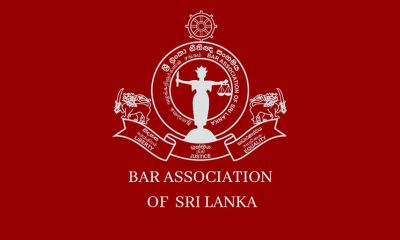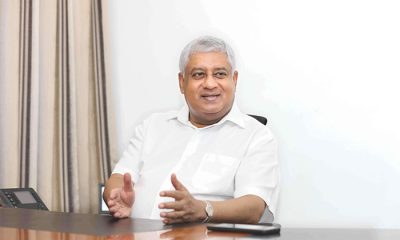Features
D E M O’Cracy obituary notice fifty years on …..

(This article was published late last year in the run up to the 50th anniversary of the original publication. The ‘author’ of the notice, the late Dr. Riley Fernando, had meticulously kept noted and documents connected to the original publication and these have been used to compile this article. It is repeated in view of the anniversary of the publicaton. – Editor)
By T. Ruth
The original D E M O’Cracy obituary was published in the State controlled Ceylon Daily News on April 24 1974. It is relevant today as it was then 50 years ago.
Curbs on freedom of assembly and of thought and expression
Press censorship and curbs on freedom of assembly were a feature of the early and mid 1970’s. On April 20, 1974 the then United Front Government imposed a curfew to ban a series of islandwide protest meetings organized by the opposition.
The Government sealed the offices of Independent Newspapers Ltd., which espoused the opposition view. Protests by the people and efforts by the Government to curb such protests and moves to stifle the free expression of thought and speech are common phenomena today as they were in the early and mid 1970’s. Moves are afoot to pass legislation to control the use of social media (Online Safety Bill) and other legislation such as the Broadcasting Regulatory Commission Bill and of course the Anti-Terrorism Legislation keeps cropping up from time to time. All this legislation is designed to curb the free expression of thought and speech.
Political and Economic Scenario There are both similarities and differences in the political and economic scenario that prevailed then and now. Foreign exchange shortages and import restrictions, rationing of food, price controls, ceiling on incomes and limits on property ownership were characteristic of the mid 1970’s. Today cost of living has spiraled to levels which are unprecedented. The high levels of taxation imposed upon on the citizenry makes life very hard for many.
Rationing of essential commodities and import restrictions in early to mid 1970’s were prevalent due to socialist policies advocated by the then Minister of Finance, Dr N M Perera. He was not prepared to accept the stringent conditions of the IMF. Instead he chose the route of austerity which meant ‘tightening of belts’ for the people. He believed that this was the way to avoid Sri Lanka becoming a bankrupt State. There were however no allegations of economic mismanagement leveled against him.
A recent Supreme Court judgment held that three Rajapaksa brothers and some of their advisors had breached the fundamental rights of the people by economic mismanagement resulting in Sri Lanka now being a bankrupt State unable to meet its debt obligations to creditors. Those found guilty of breaching fundamental rights of the people are still at large and worse still some are yet enjoying state patronage afforded to them in view of the positions held by them while the citizenry continue to suffer untold economic hardships.
- This is how the popular, mass circulating Reader’s Digest reported then Ceylon’s D.E.M. O’Cracy obituary notice hoax.
Corruption No effort is being made to pass legislation necessary for the recovery of stolen national assets. It is sad that the entire burden of the present economic crisis has to be borne by the populace and no action is being taken to take to task those responsible for corruption. In the early and mid 1970’s corruption was much less rampant than is the case at present.
The background and the ‘modus operandi’ Dr Riley Fernando the author of the D E M O’Cracy was a medical practitioner in Dehiwala. On April 21, 1974 the Government had imposed a curfew to ban mass protests which were to take place on that day. So he had no work in his medical clinic. It was towards evening that day that he got the brainwave to announce the death of democracy by way of an obituary notice.
The next day he went to Lake House and checked on the rates for obituary notices to be published in the Ceylon Daily News. He then sent the obituary notice by post with a money order to Lake House. On April 24, 1974 the most celebrated obituary notice in the history of our newspapers was published in the State run Ceylon Daily News causing roars of laughter from one end of the country to another!
It is believed that the number of copies of the Ceylon Daily News was an all-time record on that day! Everyone was clamoring for a copy of the Ceylon Daily News. It was said rightly or wrongly it had to be reprinted three times over.
Suspects There were many who were suspected of the authorship of this obituary notice. One was a well-known newspaper editor. His office was searched but it drew a blank. On the same day the obituary notice was published Dr Riley Fernando and his wife attended a social gathering at the residence of a fellow doctor. The general view among those present at the event was that there is no one in Sri Lanka who is capable of authoring such an obituary notice. It had to be the work of a foreign hand!
The day after the obituary notice appeared, a friend of Dr Riley Fernando also a fellow doctor whom he had known since his days at the Medical College visited his home with his wife. His greeting was ‘Congratulations! Your latest one is really superb!’ Dr Riley Fernando pretended to be dumbfounded.
‘Come on man’ the doctor went on ‘that obituary notice – of course I know that you did it’. He said ‘one has to have two qualities to do such a thing – firstly the wit and intelligence to think of it and secondly the courage to carry it through. You are the only person with both these qualities!’ he exclaimed.
Wreath of Red Roses A wreath of red roses was delivered to Lake House with a note of sympathy from ‘T. H. E. Masses’. The delivery boy was arrested and interrogated by the Police. He was clueless and was later released.
Interdiction of employees at Lake House Some employees of Lake House had been interdicted following the publication of this obituary notice. The training and upbringing that Dr Riley Fernando possessed was such that he could not bear to see innocent employees being reprimanded for something he had done. He was quick to write an anonymous letter to Hon Felix Dias Bandaranaike who was an important cabinet minister. He was the Minister of Public Administration, Home Affairs, Local Government and Justice at the time.
Dr Riley Fernando and Hon. Felix Dias Bandaranaike knew each other from the time they were in the kindergarten of Trinity College, Kandy. In his letter Dr Fernando requested that the Lake House employees who have been interdicted be reinstated. Otherwise he said he would have no option to own up and face the consequences. The employees were reinstated immediately and the Police were instructed to call off all investigations.
In Parliament – O’Cracy is O’kay! The subject of this obituary notice was discussed in Parliament on May 8, 1974 (Hansard pages 1686 – 1689) with an entire afternoon being taken up for discussion.
One member said that ‘This fellow must be caught and skinned alive on Galle Face Green!’ members of the opposition demanded a debate on the issue.
Dr W Dahanayake the ebullient Member for Galle insisted on having his say about the death of democracy and had to be forcibly removed from the Chamber by the Sergeant-at-Arms for defying the Speaker’s orders asking him to sit down. Parliamentary sittings suspended for five minutes in view of the resulting commotion.
Hon Felix Dias Bandaranaike treated the whole episode as a joke. He made a speech in Parliament. He said that he was away from Sri Lanka on the day on which the obituary notice had appeared but it was customary of him to read the past newspapers following his return to acquaint himself of what had taken place when he was away.
He said that he did so this time too following his return to Sri Lanka. Then he noted that a few of his friends had passed away during his sojourn overseas. One was an old Irishman named O’Cracy who had been living in Sri Lanka for many years. He said that he immediately sent his security officer to the address given in the newspapers to check on the facts and offer his condolences. The security officer had returned saying that the whole thing was a hoax.
He told me ‘There is absolutely nothing wrong with Mr O’Cracy. Not only that – all the members of his family are in good health – Mrs T Ruth and Mr L I Bertie and the rest of them’.
Hon Felix Dias Banadaranaike went on to say that in the past there were some occasions when Mr O’Cracy had some narrow escapes. One was when Dr W Dahanayake was Prime Minister when Mr O’Cracy had actually gone into hiding. Then in 1962, the Hon. Leader of the Opposition [Hon. J R Jayawardene] was stoutly defending persons who were in pursuit of Mr O’Cracy determined to destroy him.
Then in 1971, Mr O’Cracy was really in trouble. He nearly decided to go back to Ireland. He thought the insurgents there were safer than the ones here. Mr O’Cracy is extremely happy [now]. Apparently some of the wreaths which had been sent for his funeral had reached Lake House by mistake.
Dr Colvin R De Silva whose prose can be mellifluous or biting as the occasion demands it referred to the statement made by Hon Felix Dias Bandaranaike on the floor of the House that day as a ‘gem of a speech’.
The country mourns and the world sympathizes There was reference to the D E M O’Cracy obituary notice in the international press. ‘The Hindu’ reported it on April 25, 1974. The ‘Daily Telegraph’ UK made reference to it on April 26, 1974. There were references to it in the media in several other countries too. The Reader’s Digest published it in the November 1974 issue.
Dr Riley Fernando claims authorship of the obituary notice
Dr Riley Fernando left for the UK in 1976 two years following the publication of the D E M O’Cracy obituary notice in 1974. Following the General Election in 1977 there was a change in the Government. Following his return to Sri Lanka in December 1978 he decided to accept authorship for the prank that shook a Government. The receipt of a letter signed by L I Bertie took the Sunday Observer to the Galle Road Dehiwala residence of Dr Riley Fernando to meet the man who announced the death of D E M O’Cracy.
In conclusion
Dr Riley Fernando entered his eternal rest in June 2003 at the age of 75 following a brain hemorrhage.
The documents relating to the D E M O’Cracy obituary notice had been maintained so meticulously by him as if he knew that they will be necessary to author this article fifty years on.
Features
Defeating despair in the face of rising world disorder

 That rampant disorder is the starkest of global realities currently is a fact beyond dispute. While the international community is confronted with the grueling challenge of stemming such runaway disorder, an equally exacting undertaking for the world is the need to keep up its spirits in this uphill task of bringing order out of chaos.
That rampant disorder is the starkest of global realities currently is a fact beyond dispute. While the international community is confronted with the grueling challenge of stemming such runaway disorder, an equally exacting undertaking for the world is the need to keep up its spirits in this uphill task of bringing order out of chaos.
However, before getting down to any major ‘damage control’ initiatives or ‘saving acts’ in relation to the contemporary world, governments and publics would need to gain increasing clarity on the present pervasive issues in global politics. That is, educating and enlightening these sections emerge as principal needs and it is up to universities, higher educational institutions, research organizations, progressive think tanks and the like to take on these challenges.
Of the tertiary level educational institutions in Sri Lanka that have boldly and resourcefully taken on such tasks, the Bandaranaike Centre for International Studies (BCIS), Colombo, has been among the foremost. On May 14, 2024, the BCIS once again proved its capabilities in this regard when it held a largely attended and lively forum titled, ‘Multilateralism and Diplomacy for Peace’.
Under BCIS Chairperson, former President Ms. Chandrika Bandaranaike Kumaratunga and its Executive Director, Professor Emeritus Gamini Keerawella, the path-breaking nature of such BCIS initiatives has been increasingly in evidence in recent times. Panelists at the forum were, Ambassador of Japan to Sri Lanka Hideaki Mizukoshi and Resident Coordinator of the United Nations, Sri Lanka, Marc-Andre Franche. The forum was moderated by Member/Council of Management of the BCIS, Dr. Radhika Coomaraswamy.
Admitting that it is ‘difficult not to feel cynical today’ in the face of the world’s rising disorder and insecurity, Amb. Franche pointed out that multilateral institutions have not taken on current challenges effectively. For example, the UN Security Council’s dysfunctional nature in the face of present day global law and order issues has never been greater.
While it is difficult, Amb. Franche explained, to be optimistic currently, the UN has, nevertheless, forged ahead to the best of its ability to maintain world peace. It has prevented nuclear wars and helped in the socio-economic progress of countries to the extent possible. Moreover, the UN has been placing an emphasis on conflict prevention, mediation and the transformation of global peace operations in recent times.
It was Amb. Franche’s submission that the threats facing peace are vastly different today. However, the UN Secretary General Antonio Guterres has stuck to his task of being ‘the Conscience of the World’. In a historic statement recently Guterres called for a ‘New Social Contract between states and peoples, based on trust, inclusion and human rights, along with women’s active participation in all social segments.’
Ambassador Mizukoshi, among other things, pointed out that since Japan joined the UN in the mid-fifties, it has been dominant in the area of international cooperation and the socio-economic advancement of peoples.
Cooperating in advancing international peacekeeping and taking up in a major way global humanitarian relief operations, Japan has been prominent in even assisting Sri Lanka on a number of fronts. For example, in the early 2000s, Japan played a major role in conflict resolution and peace-building in Sri Lanka. Currently, it is in the forefront of Sri Lanka’s debt restructuring effort as a principal facilitator.
Japan, it was pointed out, is for peace and stability in the Asia-pacific region. It also actively supports peace diplomacy since international peace is high among its priorities.
The BCIS forum threw-up many a thought-provoking issue in current world politics for Sri Lanka and the world. It was a stimulant to fresh thinking on how the world community could forge ahead with meeting the challenge of fostering conflict-resolution and peace. This task is of the utmost importance because many are the observers who are likely to succumb to a mood of despair on seeing the increasingly aggravating lawlessness the world over.
However, it is important to point out that all peace hopes are not lost. It is particularly important that the UN Secretary General and his vast team ensure that the spirit of peace and reconciliation remains alive in them.
Although it is true that the UN system could be found to be inept in the Ukrainian and Gaza theatres in particular, the UN would do well to perceive that it still retains the initiative on the peace-building front. Its options continue to be ample and now is the time for the system to redouble its efforts to exploit them patiently and discreetly.
The unique strength of the UN is its ability to plod along with providing material and emotional assistance to the needy of the world on a non-discriminatory basis. These efforts have not and are unlikely to produce positive results in the near future but by being constantly there for the deprived the UN could inspire the needy with the hope that all is not lost for them in terms of bettering their lot eventually and blossoming into relatively stable persons and communities.
With time, such wholesomeness and stability could lay the basis for enlightened, democratic thinking among the social segments concerned. But the world would need to wait with immense patience until these welfare efforts of the UN bear fruit. There are no short cuts to bringing into being wholesome, democratically-inclined individuals and communities.
Besides providing nutritious food to the poor, the UN needs to work untiringly towards meeting the educational needs of the deprived. The long-term consequence of such efforts is the coming into being of democracy-conscious persons and communities. Thus, UN personnel cannot afford to give in to a mood of despair.
But there is no underestimating or denying the heartburn of those sections that want to see an improvement in the present lawlessness. A primary cause for such disenchantment is the irresponsible, reckless conduct of the foremost powers. Their agony is compounded by the fact these powers are permanent members of the UN Security Council.
There is the case of the US, for instance, which touts itself as the ‘World’s mightiest democracy’. However, it has done precious little to bring the Israeli state to the negotiating table over the issues in the Gaza. But on this question too all is not lost. Recently, apparently in reaction to increasing protests at home, the Biden administration had delayed some arms shipments to Israel.
Apparently, protests by democratic forces could make a dent in the conduct of governments that are committed to supporting repressive states. Much more needs to be done by the US, of course, to enable a negotiated settlement to solidify itself in the Middle East, but we have some proof in the US decision that democracy-inclined societies provide the best hopes for the world’s betterment. Thus, is the UN vindicated by plodding on with the task of fostering the wellbeing of the deprived the world over. Such efforts provide the fundamental basis for highly literate and democratic societies.
Features
Some thoughts on children with autism

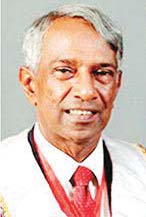 Dr B. J. C. Perera
Dr B. J. C. Perera
MBBS(Cey), DCH(Cey), DCH(Eng), MD(Paed), MRCP(UK), FRCP(Edin), FRCP(Lon), FRCPCH(UK), FSLCPaed, FCCP, Hony FRCPCH(UK), Hony. FCGP(SL)
Specialist Consultant Paediatrician and Honorary Senior Fellow, Postgraduate Institute of Medicine, University of Colombo, Sri Lanka.
Joint Editor, Sri Lanka Journal of Child Health
The diagnosis of a condition called autism in a child has the potential to be a totally devastating event for the parents and family members. However, right at the outset, it is most important to point out that it is now called autism spectrum disorder (ASD). The reason for using this extended terminology is that there is a range of manifestations in it which could be from the mildest forms of it at one end, to the most severe types at the other. That is why it is now classed as a ‘spectrum’ where a given child with the problem could be professionally assessed and placed at a point in the range of the possible manifestations of the disorder. The crux of the matter is that it is vitally important to note that individuals with ASD can vary widely in their abilities, challenges, and support needs as well. Furthermore, some individuals may have additional co-occurring conditions such as intellectual or developmental disabilities, anxiety disorders, or attention-deficit/hyperactivity disorder (ADHD). The World Health Organisation (WHO), in a communique dated November 2023, reports the global incidence of autism spectrum disorder to be as much as one in a hundred children. The United Nations General Assembly has denoted the second of April of each year as World Autism Awareness Day.
Autism is a disorder of the development of the brain, characterized by a wide range of symptoms and challenges that affect social communication, behaviour, and sensory processing by the brain. They have problems with social interaction and communication difficulties, classically manifested by delay in speech development. They may have difficulties in understanding and using verbal and nonverbal communication cues such as gestures, facial expressions, and tone of voice. They may struggle with initiating and maintaining conversations, understanding social norms, and forming relationships with others. They have very low attention spans and to put it quite bluntly, as a result of all these drawbacks, these children seem to live in a world of their own.
Many children with ASD engage in repetitive behaviour and routines, such as hand-flapping, rocking, or repeating words or phrases. They may also have highly focused interests in specific topics, objects, or activities, especially toys with repetitive movements. They often experience heightened sensitivity or even reduced sensitivity to sensory stimuli such as light, sound, touch, taste, and smell. Some of them may have difficulty adapting to changes in routines or environments and may prefer sameness and predictability. They may also demonstrate rigid thinking patterns and have trouble understanding other perspectives or abstract concepts. Many individuals with ASD struggle with executive functioning skills such as planning, organization, problem-solving, and impulse control. This can impact their ability to complete tasks, manage time effectively, and navigate daily life independently. Most importantly, children with autism often find it challenging to understand social cues, navigate social situations, and form and maintain relationships with others. They may have difficulty interpreting others’ emotions and intentions, leading to social isolation or misunderstandings.
All these considerations are well and good. But here is something that is vitally important and would be a source of some solace to parents of children with ASD. Gone are the days that autism was looked at as a ‘lost cause’. Now the pendulum has completely swung back as we know for sure that so much can be done for children with this problem. It is crucial to suspect and make the diagnosis as early in the life of a baby as possible, simply because the sooner we start doing all the necessary things, so much better the ultimate results would be. There is incontrovertible research evidence that early interventions do go a long way in improving the results of proper scientific management. Early diagnosis, intervention, and support are crucial for helping individuals with ASD reach their full potential and lead fulfilling lives. Towards an early diagnosis, two features may help tremendously. One is speech delay, while the other is a lack of eye and social contact. These features when presented by the parents should never be dismissed out of hand, even by doctors.
Amongst many things that can be offered to children with ASD, an important and useful initiative that is very helpful in managing ASD is the Son-Rise Programme. It is an intensive, home-based therapy approach for children with autism spectrum disorder that was developed by Barry Neil Kaufman and Samahria Lyte Kaufman in the 1970s, inspired by their experiences with their son, Raun, who was diagnosed with severe autism at a young age. The programme gained significant attention after the release of the documentary film “Son-Rise: A Miracle of Love” which documented the Kaufmans’ journey with their son which led to the development of the programme. The entire initiative is based on the premise to show how much can be done for children with autism spectrum disorder.
The Son-Rise Programme is based on the belief that children with autism have the potential to overcome their limitations and develop meaningful social connections with others. The components of the initiative emphasise building a strong, accepting, and interactive relationship between the child and the caregivers, typically the parents. It is rooted in the principles of unconditional love, acceptance, and a non-judgmental attitude towards the child. The very basic but hallowed principle underlying this initiative is for us to join the child in his or her world, before we try to get the child to join our world.
Given below is an overview of the key components and principles of the Son-Rise Programme:-
Acceptance and Unconditional Love: The programme emphasises accepting the child exactly as he or she is, without trying to change or “fix” them. Caregivers are encouraged to love their child unconditionally and to realise that autism is a unique aspect of their personality.
Joining and Interactive Attention: Caregivers are taught to join the child in their world by engaging in activities that interest the child. This involves following the child’s lead, joining in their repetitive behaviour or interests, and using these as opportunities for connecting with the child.
Empathy and Understanding: The programme encourages caregivers to empathise with the child’s experience and perspective.
By understanding the motivations behind the child’s behaviour, caregivers can better connect with them and respond in a supportive manner.
Building Rapport and Connection: Caregivers are taught techniques for building rapport and connection with the child, such as mirroring their body language and vocal patterns, maintaining eye contact, and using enthusiastic and engaging communication styles.
Creating a Structured Environment: While the Son-Rise Programme emphasises flexibility and following the child’s lead, it also recognises the importance of structure and predictability for children with autism. Caregivers are encouraged to create a structured environment with clear routines and boundaries to help the child feel safe and secure.
Celebrating Every Success: The programme when implemented at home celebrates even the smallest successes and accomplishments of the child, thereby reinforcing positive behaviour and fostering a sense of confidence and self-esteem.
Continuous Learning and Growth: Caregivers are encouraged to continuously learn and grow alongside their child, seeking out resources, training, and support to enhance their understanding of autism and their ability to support their child’s development.
The entire enterprise needs to be facilitated and supervised by Paediatricians and psychologists working as a team. For the disorder per se, there are no magic silver bullets in the form of medicinal drugs although some associated features such as hyperactivity may warrant certain specific medications.
The Son-Rise Programme has garnered both praise and criticism within the autism community and among professionals. Supporters of the programme laud its emphasis on acceptance, love, and building meaningful connections with children with autism. They point to anecdotal evidence of significant improvements in social skills, communication, and overall quality of life for some children who have participated in the program. The internet is full of several success stories.
Critics, however, argue that the Son-Rise Programme lacks empirical evidence to support its effectiveness and may promote unrealistic expectations for “recovery” from autism. Some professionals have raised concerns about the programme’s focus on intensive parent involvement and its departure from more evidence-based interventions, such as Applied Behaviour Analysis (ABA).
Of course, one must not run away with the notion that the Son-Rise Programme is a panacea for all ills in the Autism Spectrum Disorder. It may not work all that well in certain children with ASD and expert help would be required in such cases. However, it must be reiterated that the Son-Rise Programme does offer a unique and holistic approach to supporting children with autism and their families. It is centred around the principles of acceptance, love, and connection. It can be a huge boon for parents who could be at their wit’s end to look after a child with ASD. While it has inspired many families and caregivers and shown promising results for some individuals, it remains a subject of debate and further research within the autism community. What we need to desperately believe is that these children are not born in a broken state of mind but are assembled a little bit differently in their higher mental functions. Some of them can and do grow up to be useful citizens of a given nation.
Features
DERRICK J… helping you discover the true power of your voice
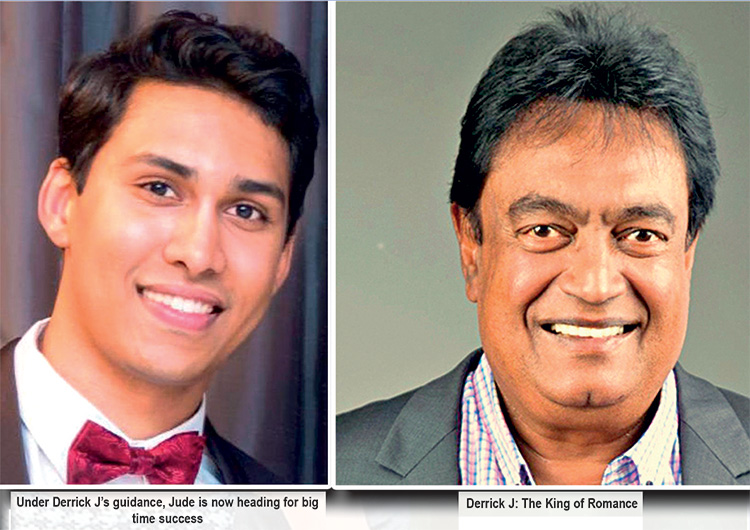
 With over 40 years of experience in television performance, and 45 years as a recording artiste, Derrick J. (also known as Derrick Junkeer), who resides in Australia, has branched out and is now helping folks discover the true power of their voice…through his newly-launched vocal school, based in Melbourne.
With over 40 years of experience in television performance, and 45 years as a recording artiste, Derrick J. (also known as Derrick Junkeer), who resides in Australia, has branched out and is now helping folks discover the true power of their voice…through his newly-launched vocal school, based in Melbourne.
Says Derrick: “Our curriculum, at Derrick J Vocal Training School, is tailored to meet the needs of students at every skill level – from absolute beginners to seasoned amateur singers.
‘We believe in the power of continuous practice, hands-on learning, and drawing inspiration from diverse musical genres, and our goal is to provide students with the tools they need to unleash their full vocal potential.
Derrick went on to say that his school offers a comprehensive range of singing lessons, personalised to each student’s goals and abilities.
“From vocal exercises and warm-ups to performance techniques and microphone skills, we cover all aspects of the singing journey.
“We offer tailored singing lessons for adults and children alike. Whether you’re a complete beginner or a seasoned amateur, we will provide you with the tools and techniques you need to succeed.”
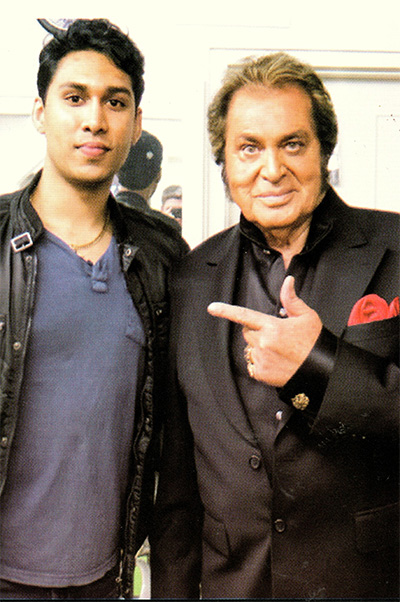
Derrick J’s student Jude with Engelbert
Infact, one of Derrick J.’s students (Jude) had the privilege of meeting Engelbert Humperdinck himself, thanks to a remarkable performance that caught the legendary artiste’s attention on YouTube.
And Judeis now on his way to big time success after attending Derrick J’s Vocal Training School.
And this is what Jude has to say: “Derrick J. is not only a masterful singer but also an exceptional mentor in the art of performance.
“Under his guidance, I’ve grown from strength to strength, performing at various venues and even catching the attention of music legends like Engelbert Humperdinck.”
Known as the King of Romance, Derrick J. covers songs by Engelbert Humperdinck, Tom Jones, Elvis Presley, John Rowles, Michael Buble, Frank Sinatra and many more.
He performed in Colombo, in December last year, at the All-4-One concert, held at the Lotus Tower outdoor arena.
Derrick J. says he can be reached via WhatsApp at +61438874488 or email at derrickjunkeer@gmail.com.
-

 Business6 days ago
Business6 days agoGlobal automakers increase assembly operations in Sri Lanka
-

 Business7 days ago
Business7 days agoDialog Axiata renews pledge to GSMA’s Connected Women Commitment Initiative
-

 Sports7 days ago
Sports7 days agoDialog Powers National Para Athletics Championship 2024
-

 Sports7 days ago
Sports7 days agoNestle Milo empowers Sri Lanka’s future football stars
-

 News4 days ago
News4 days agoBASL in JICA-funded anti-corruption study controversy
-

 Business5 days ago
Business5 days ago‘Dialog Enterprise Partners with UTECH Technologies for Industry 4.0 Transformation’.
-

 Editorial6 days ago
Editorial6 days agoDiana under pursuit
-

 Features5 days ago
Features5 days agoTeflon Tiran and Visa Outsourcing






















